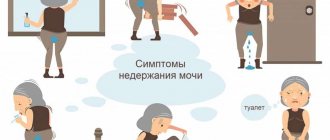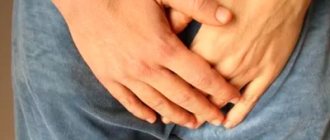Thursday, October 24, 2019
Cystitis is a disease in which inflammation affects the bladder. Due to its anatomical features, it affects women more often than men. The disease can be caused by various reasons, but in general it is provoked by bacteria, viruses or fungi. The disease is quite painful, reducing the quality of life and causing significant discomfort. Therefore, it is important to know how to prevent the occurrence of pathology and whether cystitis is transmitted from an already sick person.
Causes of the disease
A woman of any age can get cystitis. The development of the disease is especially likely under the following circumstances:
- When the body is hypothermic, and especially when the pelvic area is hypothermic. For an ordinary woman, it is enough to sit on a cold stone for 15–20 minutes, and the appearance of this disease (and not only it) can be guaranteed.
- With prolonged sitting position. For example, you work at a computer and do not get up from your very comfortable chair for 4-6 hours.
- For frequent and prolonged constipation.
- If you eat very spicy foods, a lot of spices, like overcooked foods and do not drink enough fluids after meals, then the risk of developing a number of urological diseases (cystitis and urethritis, and eventually pyelonephritis) increases.
- Previous urological, gynecological or venereal inflammatory diseases (urethritis, gonorrhea, adnexitis, endometritis, etc.), especially if you did not pay enough attention to your health, did not complete treatment or tried to treat yourself.
- Chronic foci of infection in the body (untreated carious teeth, any chronic inflammatory diseases).
- Any other condition that contributes to the suppression of your body’s immune system (for example, overtraining in athletes, regular lack of sleep, overwork, poor and irregular nutrition, chronic stress, etc.).
First of all, cystitis is a failure to comply with hygiene rules, including sexual hygiene.
- When partners move directly from anal to vaginal intercourse.
- When a woman wipes herself incorrectly after defecation (a woman should only wipe from front to back).
- When a woman rarely changes tampons or pads during her period.
- When wearing tight and dense clothes, tights, underwear for a long period of time. In case of non-compliance with the urination regime. A woman should urinate at least 5 times a day. The infection easily enters the bladder if the interval between urinations is very long.
Also, relapses of cystitis can be triggered by the following factors:
- If the treatment of the disease was incomplete, it ended prematurely. Thus, untreated cystitis can give rise to the proliferation of bacteria with greater resistance to medications.
- Re-infection. This is determined most likely by individual predisposition rather than by the result of “bad” treatment of cystitis.
- Injuries, stress on the back.
Sexual transmission
Signs of cystitis may make the patient think that this disease is sexually transmitted: sharp pain in the lower abdomen at rest or when urinating, frequent urge, pus or mucus in the urine, itching of the genitals. However, those bacteria that cause sexually transmitted diseases will not provoke the development of cystitis. The nature of bladder inflammation is completely different; it is not so easy for the bacteria that cause it to penetrate inside a person through sexual contact with the patient. However, under certain conditions favorable for bacteria, it is possible to become infected with cystitis from a sexual partner. This does not happen in the same way as during the transmission of a common sexually transmitted infection. In order for pathogenic microorganisms that provoke inflammation to pass from person to person and cause cystitis, a combination of certain factors is required. The likelihood of getting sick during sexual intercourse increases with:
- hypothermia of the body, as a result of which the protective functions of the immune system weaken;
- constantly experiencing stress, and this means both nervous and physical stress - this also affects the body’s resistance to infections;
- poor lifestyle: poor nutrition and sedentary work contribute to stagnation of blood in the vessels, reducing a person’s ability to resist diseases;
- the presence of a habit of enduring for a long time when you want to go to the toilet: urine stagnates, forming a favorable environment for the colonization and reproduction of bacteria;
- wearing very tight underwear: as with a sedentary lifestyle, this leads to blood stagnation;
- the presence of chronic diseases that have not been treated for a long time.
Microbes that can cause cystitis are transmitted both from man to woman and vice versa, and through other types of sex other than traditional sex. For example, during oral sex: pathological microorganisms may be on the mucous membrane of the partner’s mouth. You can also become infected with cystitis through anal intercourse: there may be pathogenic bacteria in the intestines, which, once in the urethra, that is, the urethra, will lead to the development of inflammation of the bladder.
Chronic cystitis
The disease is divided into acute and chronic cystitis according to its course. The acute form is inflammation of the mucous membrane of the bladder, usually occurring suddenly after exposure to a provoking factor (for example, hypothermia). Often, acute cystitis (especially with improper treatment) can become chronic. Chronic cystitis may have less severe symptoms and be recurrent. The main danger of the disease is that chronic cystitis often “hides” another disease. Therefore, treatment of cystitis should be based on a thorough diagnosis of the disease.
Cystitis can also be bacterial and non-bacterial, infectious and non-infectious.
Judging by the name, infectious cystitis is caused by various types of infections, these can be streptococci, streptococci, enterococci, pathogens of various sexually transmitted diseases. Treatment of cystitis of an infectious nature is aimed at treating the pathogen.
Cystitis of a non-infectious nature occurs when the bladder mucosa is irritated by drugs, chemicals, foreign bodies, or burns.
The last type, interstitial cystitis, is a non-infectious disease of the bladder, although there is no single theory for the causes of its occurrence. Interstitial cystitis occurs more often in women than in men and children. The disease is “debilitating” in nature, as it is characterized by frequent urination and pelvic pain, which makes it impossible to lead a normal lifestyle. Treatment can be either conservative or surgical (see how to cure cystitis).
Treatment for cystitis depends on its type.
Symptoms
The peculiarity of chronic cystitis is that it has a blurred clinical picture. However, if any of these complaints appear, you should immediately contact a urologist for advice:
- Frequent urination;
- Pain, which can have several options: Constant, regardless of urination;
- Painful urge;
- Pain occurs after urination;
- The pain may be localized in the lumbar region;
With each subsequent exacerbation, these symptoms become more and more blurred, and it becomes difficult to establish a diagnosis.
What are the manifestations of cystitis?
The disease begins acutely. Its main manifestation is frequent and painful urination. Sometimes patients have to urinate every 15–20 minutes. During urination, and sometimes outside of it, pain is noted in the suprapubic region. It takes some effort to start urinating, and at the end of it a few drops of blood may appear. Urine may become cloudy.
In severe cases of the disease (acute cystitis), the temperature rises, nausea and vomiting appear, and the urine becomes opaque and milky. Perhaps all these signs signal another disease, so you should immediately consult a doctor for diagnosis and treatment.
Diagnosis of the disease
For cystitis, the urologist usually performs only one test (in addition to the usual blood and urine tests) - cystoscopy. The bladder is filled with a special liquid and a cystoscope is inserted into it - a special optical device that allows you to “look” at the condition of the bladder from the inside. This procedure is unpleasant, but painless, especially if the doctor uses painkillers. If the symptoms are pronounced, the doctor will most likely prescribe general antibiotics; cystitis will be treated in the future based on the diagnostic results obtained.
Household transmission route
It is not possible to become infected with cystitis at home. The concentration of pathogenic microbes is quite low, even if a person uses a toilet without an individual lining immediately after a patient with cystitis. In addition, bacteria will not be able to enter the urethra on their own when swimming in a public pool.
If a person already has a certain number of microbes in the bladder (for example, as mentioned earlier, with the habit of enduring the urge for a long time), then the development of cystitis can be triggered by a cold transmitted from person to person by airborne droplets. But this happens indirectly, due to the weakening of the immune system.
Treatment of cystitis
Treatment of the disease consists of keeping the patient in bed, drinking plenty of fluids, and excluding fried, hot, spicy, and pickled foods from the diet. A course of antibacterial therapy is carried out, and sometimes physiotherapy is prescribed.
Dear ladies, do not try to cure cystitis on your own! Most likely, you will take 2-3 tablets of some antibiotic that your neighbor used to treat her cat for dysentery, and the clinical manifestations of the disease will subside. You will perk up, kiss your neighbor and all her animals, and consider yourself healthy. But you did not eliminate the disease, but only caused it to occur in a latent form (chronic cystitis). Cystitis will certainly make itself felt as soon as you catch a cold or flu again, and then it will be much more difficult to cure it. Moreover, treatment of cystitis with antibiotics in unlimited quantities can lead to the development of strains with high resistance to drugs. After treatment of the disease, re-diagnosis is necessary.
Also, special attention should be paid to cystitis during pregnancy, since most often its exacerbation occurs during this period if you suffer from this disease. How to treat cystitis if taking antibiotics is strictly contraindicated during pregnancy? The disease can be treated during pregnancy using bladder instillations. In any case, doctors have good techniques that help you get rid of unpleasant symptoms, as well as calmly carry and give birth to a healthy baby. The main thing is not to delay visiting a doctor if you have already encountered this disease before.
The best results are obtained by treating the disease, including antibacterial therapy, eliminating the causes that caused it, as well as general strengthening of the immune system.
Why does cystitis develop during pregnancy?
According to statistics, every 10th pregnant woman experiences signs of cystitis. During pregnancy, the risk of inflammatory processes actually increases. Among the reasons:
- decreased general immunity;
- changes in hormonal levels;
- enlarged uterus;
- deterioration of the blood supply to the bladder and loss of tone of its mucous membrane (stagnation processes occur and the proliferation of infectious agents).
However, not all of the features of the female body that we have described can lead to the development of cystitis. You can suspect you have the disease if you have the following symptoms:
- strong frequent urge to urinate;
- discomfort in the pelvis, pubis, lower abdomen;
- burning in the urethra when urinating;
- general malaise, intoxication of the body.
In this case, the urine darkens, sediment, clots of pus, and blood can form in it. Patients may complain of back pain, fever and vomiting.
We do not recommend self-medication, even if you are sure that you have the disease, because... encountered him before. For each form of cystitis, the doctor selects individual therapy. Learn more about how the disease is classified.
How to avoid cystitis?
Prevention of the disease for women consists primarily of eliminating and reducing the effects of factors that cause cystitis, as well as observing the rules of hygiene that were mentioned earlier. Do not wear too tight, tight underwear, try to eat less hot and spicy foods, alcohol, and try to urinate after sexual intercourse. Dress warmly, try not to freeze for a long time. If you have a sedentary job, take breaks every hour and a half and just stand or walk for 5 minutes. If you suffer from constipation, then eat more vegetables, fruits and coarse fibrous foods, take laxatives, etc. If you happen to eat something very spicy, a lot fried, pickled or fermented, wash this food down with enough water. You don’t need to treat cystitis yourself—doctors don’t bite. Be more attentive to yourself and your health!








